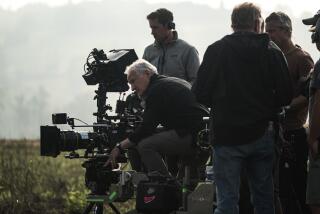Film on AIDS to Honor Crusading Doctor
- Share via
NEW YORK — Before his Sept. 2 death aboard Swissair Flight 111, the renowned epidemiologist Jonathan Mann had been juggling several new projects, including a documentary based on his acclaimed book “AIDS in the World II.”
His goal, according to admirers, had been to reach out from his elite world of scientists and heads of state to the general public, and more widely disseminate his conviction that the global AIDS epidemic threatened efforts to stabilize the economies of developing countries.
Now a small group of his disciples is beginning production of the film amid questions of how best to memorialize Mann himself without overshadowing his message.
“The film will be a tribute to Jonathan and his ideas but it’s not going to be a film about him,” said director Robert Bilheimer, who plans to start shooting “A Closer Walk: Lessons From AIDS in the World” in Haiti early next month. “All of us feel that a film about global AIDS needs to be done.”
Bilheimer and executive producer Eric Sawyer, a New York-based AIDS activist, have high hopes for the $1.5-million project, including some sort of global simulcast on World AIDS Day 1999 (Dec. 1). They’re also aiming for an Oscar nomination, a distinction that Bilheimer received for his 1988 feature-length documentary, “Cry of Reason.”
That film told the story of apartheid through the eyes of clergyman Beyers Naude, who is credited with becoming the first Afrikaner to publicly cross over to the side of South African blacks. Naude’s tale was “a wonderful story . . . that appealed even to people who didn’t know much about apartheid and didn’t care but could relate to his moral courage,” Bilheimer said in an interview.
Like Naude, the empathetic Mann was widely viewed as a hero who took an early and controversial stance--in his case, connecting human rights to health. The Harvard-educated disease detective argued that the spread of AIDS worldwide wasn’t due to irresponsible behavior and immorality, but ran along “international fault lines” of poverty and social inequality.
“He was fearless,” recalled Mathilde Krim, a biologist and co-founder of the American Foundation for AIDS Research. “He was the kind of person who was capable of telling anybody what he thinks.
“His great accomplishment in life,” Krim continued, “was to have convinced the U.N. that the first thing to do, before spending millions of dollars, is to tell countries to please not discriminate, not abandon certain groups, and don’t frighten” people away from medical care.
Mann had been studying the virus for years but gained international prominence in 1986 when he founded the World Health Organization’s Global Program on AIDS. After building the program into the WHO’s largest, he resigned in 1990 over conflicts with WHO’s director general, Hiroshi Nakajima.
Mann returned to Harvard to found a center for health and human rights, then left early this year to become dean of the School of Public Health of Allegheny University of the Health Sciences in Philadelphia. The 51-year-old doctor was on his way to Geneva for a series of strategy sessions on AIDS when he and his second wife, Johns Hopkins vaccine researcher Mary Lou Clements-Mann, perished in the Swissair crash off Nova Scotia.
Bilheimer, who grew up in Geneva’s international community, plans to return to South Africa to shoot portions of “A Closer Walk.” The big challenge, both he and Sawyer acknowledged, will be to make Americans care about AIDS cases overseas, especially when recent advances in treatment have cut the domestic mortality rate in half.
“AIDS in general is a tough sell,” noted Krim, whose late husband, Arthur Krim, headed Orion Pictures and United Artists. Krim said she plans to help raise funds for the documentary as well as to contribute her own money.
*
Bilheimer and Sawyer are buoyed by Krim’s endorsement, as well as by informal commitments from PBS to broadcast the film on TV and from Direct Cinema Limited to distribute it in theaters. The Santa Monica-based Direct Cinema Limited handled the documentary “Common Threads: Stories From the Quilt,” which won an Academy Award.
“I think you have a winner,” Direct Cinema President Mitchell Block wrote Bilheimer.
That was in 1997, more than a year before Mann’s death, and exactly how Mann’s ideas will be conveyed in the movie remains unresolved. Bilheimer said he wants to quote from Mann’s numerous public speeches using voice-overs, and hopes to interview close colleagues, including Dr. Daniel Tarantola, advisor to the director general of WHO, and Dr. June Osborn, president of the Josiah Macy Jr. Foundation.
Both doctors said this week they had not spoken to Bilheimer about the film since before Mann’s death and felt his relatives ought to be consulted before moving forward. “The situation has suddenly and tragically changed, and we need to consult family on the project,” said Tarantola, a Harvard lecturer who was Mann’s co-writer and editor on “AIDS in the World.”
Jeremy Mann, co-executor of his brother’s estate, spoke with Bilheimer for the first time last week and said he felt assured of the filmmaker’s good intentions. The Northern California pediatrician said he supported the basic idea, as did Mann’s three children, and had no interest in influencing the film other than making sure it was “of quality.”
Jeremy Mann said his brother had left at least three unfinished projects, including the Bilheimer film and two books, and that he was consulting intellectual property attorneys to ensure all are completed in ways that protect Jonathan Mann’s legacy.
“If the movie is well made,” said Krim, “and they manage to travel around the world and show what happens with AIDS--the suffering and also, sometimes, the great heroism--then the film itself will be the memorial. It doesn’t need any commentary.”
More to Read
Only good movies
Get the Indie Focus newsletter, Mark Olsen's weekly guide to the world of cinema.
You may occasionally receive promotional content from the Los Angeles Times.










